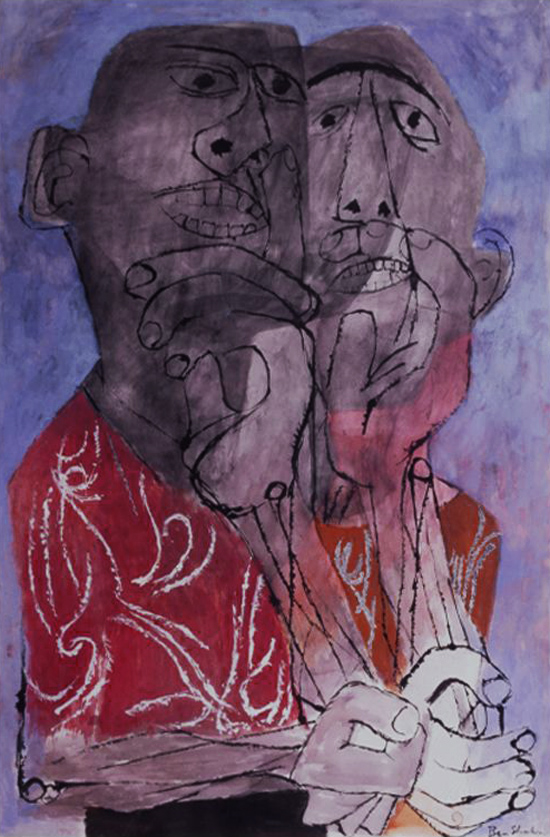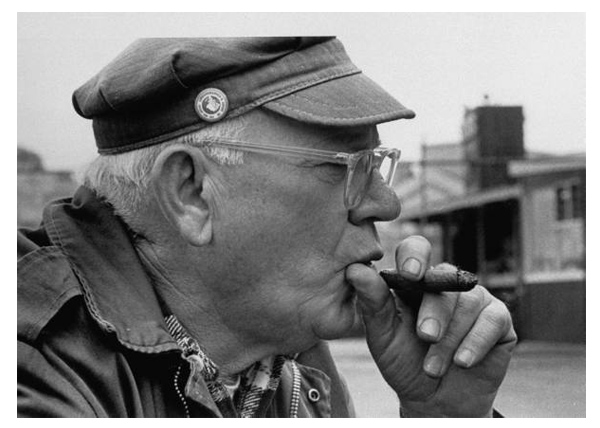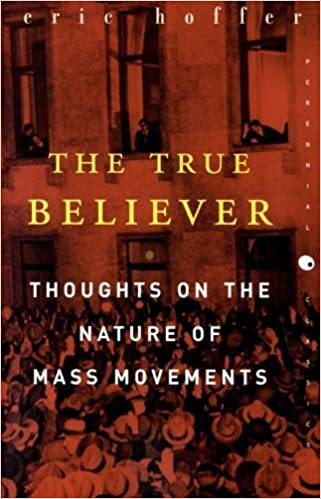by Pedro Blas González (June 2020)

Scorn, Ben Shahn, 1952
Unless a man has the talents to make something of himself, freedom is an irksome burden.
—Erik Hoffer, The True Believer
Eric Hoffer (1902-1983) was a singular thinker. He was born in New York City. to parents who were German immigrants. Very little is known of Hoffer’s early years, creating the suspicion that he may have been born in Germany, and arrived in America as a young man.
Hoffer is a philosopher in the original sense of the word. His work addresses concrete concerns that seek life-affirming answers. Rhetoric, radical skepticism and intellectual hairsplitting, he asserts, defeat the purpose of philosophizing.
Philosophy is a vital activity that acts as one of the essential pillars that prop man up to truth, regardless of the outcome. This is because honest philosophical reflection is not an intellectual luxury. It is instead a vital way of life that allows man to make sense of human reality.
Hoffer’s thought contains many aspects of stoicism. He embodies that indispensable quality that informs the thought of great thinkers: intuition of the essences that inform human reality, and the necessary perspicuity to make them cohesive. In the absence of these staple qualities of philosophical reflection, philosophy quickly falls prey to positivism.
Ironically, because he lived late into the twentieth century, a time that saw an explosion of career possibilities for the chattering class, Hoffer found himself in the difficult position of having to remain a solitary thinker.
By the second half of the twentieth century, positivism had abandoned the need to make sense of human reality. Instead, academic philosophers became content with stale, self-referential hairsplitting. This was a betrayal of the queen of the sciences. This situation increasingly made Hoffer’s moral, heuristic teaching a thing of the past. By the 1970s, Hoffer was viewed as going against the intellectual fashion of the time.

Eric Hoffer, American Philosopher
As a thinker, and not merely a writer, Eric Hoffer is supremely original. One of the dominant themes of his thought is the nature of the autonomous individual, and how this entity exists as a cosmic being. This is one reason why Hoffer’s thought cannot be reduced to quantitative sociological and psychological categories.
By the 1970s, reflection on human existence, Hoffer argues, had been demoted to social/political categories. Metaphysics was turned into positivistic and listless theory of knowledge.
Hoffer’s thought addresses the nature of individual persons and their stance in the world. He is essentially a stoic, uprooted in a world where man has lost moral/spiritual bearing. For instance, when Hoffer writes about self-possessed intellectuals, he does so from the understanding that they do not represent the world of the men and women with whom he shared a vast amount of time working.
Hoffer is an original thinker for several reasons. He reflects on man’s capacity for self-rule, and how the embrace of free will is ultimately responsible for the upkeep of open, democratic societies. Hoffer pointed out that free will came under fire through the myopic poverty of social/political categories. He understood to what alarming degree American culture had become politicized and poisoned by radical ideologue intellectuals.
Hoffer’s thought highlight’s the nature of differentiated, self-governing individuals and their contribution to open societies. While many commentators and critics of his work have focused on the content of his books (race relations, individual freedom, personal responsibility, duty, etc.), his thought is essentially philosophical anthropology. This is because Hoffer’s thought asks: What is human nature?
He is clear about the meaning of his words. He contends that, because he lived among the derelict men and women of the world, he never failed to capture the motivations and aspirations of working people. His experience working alongside men and women in the fields of northern California and the San Francisco waterfront taught him not to romanticize the virtues and vices of working people.
Hoffer’s books contribute immensely to eradicate some of the social/political illusions of people who make a living from paying lip-service to workers.
Because Hoffer worked with the people who some intellectuals use as fodder to construct abstract theories, he came to detest abstraction and theories that obfuscate human nature. He took pride in writing and thinking about things he experienced firsthand. Ironically, this facet of his thought puts Hoffer’s thought in an unfair position today.
Hoffer had very little compulsory education. Yet he possessed a tremendous zest for knowledge. After teaching himself to read as a young boy, he became a lifelong voracious reader. The study of history was his favorite.
The True Believer
Hoffer offers insightful solutions to many pressing problems of our time, including how best to utilize free will in response to liberty in Western democracies. His most important book is The True Believer (1951), a superb example of philosophical perspicuity.
Hoffer’s books are deceptively simple. He does not utilize neo-logisms or fashionable academic theories. His prowess as a thinker is rooted in respect for common sense and an uncanny ability to communicate profound ideas.
Hoffer argues that personal freedom—what equates to everyman’s existential burden—causes some people to neglect duty. He is one of the few thinkers in mid twentieth century who realized that free will was becoming a burden.
Hoffer’s understanding of mass man is monumental. The True Believer falls into a unique class of intelligent books that warn us about the dangers of communism and the intellectuals who shape and promote it. The latter was a phenomenon of the twentieth century.
Hoffer’s philosophic vision detected a time of change, when intellectuals placed themselves at the service of what later the French philosopher, Francois Revel, referred to as the totalitarian impulse.
Hoffer had a difficult life. However, he did not romanticize his experiences as a wayfaring young man. There is no sense of adventure in his description of life as a longshoreman. He was not a rebel without a cause. It is a significant detail of his biography that he did not use the people he worked with as tokens to promote social-political notions of disenfranchisement, and other catch-phrases so dear to radical ideologues.
His fame as a thinker and writer came after the publication of The True Believer. By the 1960s, Hoffer’s thought had come under attack from radical ideologues. This is a significant fact, for that was a time of Marxist student revolts.
Had Hoffer played the role of angry revolutionary, he would have gained vast fame and wealth. Many radical intellectuals during that time and after did so, becoming rich while carrying the banner of revolution.
Also, had Hoffer joined the affected band of pseudo thinkers who twisted public opinion in the 1960s, he would have garnered immense fame among the radicals who strove for political power at the time. He could have sold books in much greater numbers. Instead, he chose not to prostitute his convictions, a condition that is in keeping with great thinkers.
Hoffer’s prescient understanding of the upheavals of the 1960s is indicative of his grasp of the historical events and radical ideology of the latter half of the twentieth century. It would have been easy for him to play the American counterpart of the pampered French communist, and Nobel Prize winner, Jean-Paul Sartre. Such a career-making move would have safeguarded him from many unsavory situations; he would have rubbed shoulders with the power brokers of his time. Hoffer would have also saved himself a great number of headaches from the attacks leveled at him by malcontented critics.
Hoffer’s definition of the personality of true believers is that of a fanatical person who is easily blinded by radical, mass-man notions. Part of the profundity and insight of The True Believer originated in Hoffer’s firsthand account of the fanatical beliefs and actions of true believers. Today, we can substitute fanatical for radical ideologue.
Hoffer’s thought is unique because he did not consider himself an intellectual. The True Believer is one of several important books that trace the radical ideology of true believers in the bloody twentieth century. The True Believer is a rare psychological and moral exposition of the Soviet new man, and how that ideologically crafted entity morphed in Western democracies.
Hoffer’s Perspicuity
While The True Believer is Hoffer’s first book, it is the mature thought of a thinker who, by the time of the book’s publication, had spent several decades working alongside other people in difficult jobs. His thought is boosted by intuitive perspicuity. With an economy of language that does not over- intellectualize his topics, Hoffer offers stark realism about human nature. Observation of our surroundings that leads to honest insight is an essential tool of thoughtful philosophers.
intellectualize his topics, Hoffer offers stark realism about human nature. Observation of our surroundings that leads to honest insight is an essential tool of thoughtful philosophers.
The True Believer is one of the first English language works of philosophy that addresses the crisis of autonomy and individuality—vis-à-vis mass society—during the twentieth century.
Few cultural commentators and historians of ideas have caught on to the fact that Hoffer writes about the nature of work from the perspective of working people. His thought does not offer a radicalized rendition of labor.
Other comparable works to The True Believer include: José Ortega y Gasset’s The Revolt of the Masses, Albert Camus’ The Rebel, Gabriel Marcel’s Man and Mass Society, Czeslaw Milosz’s The Captive Mind, The Opium of the Intellectuals, Malcolm Muggeridge’s work, especially after his disheartening return from the Soviet Union, and Solzhenitsyn’s Warning to the West. These works explain how contradictory and fallacious ideas gave rise to Marxism and communism in the twentieth century.
The Revolt of the Masses, Ortega y Gasset’s seminal work, appeared in 1930 and was translated into English in 1960. Albert Camus’ analysis of revolutionary nihilism and tyrannical Marxist governments and institutions, The Rebel: An Essay of Man in Revolt, was published in 1951. It appeared in English in 1953. Czeslaw Milsoz’s portrayal of the communist psyche in The Captive Mind was published in 1953. Gabriel Marcel’s Man Against Mass Society analyzes man’s embrace of nihilism and what this means to personal autonomy in mass society. That work was published in English in 1962. Solzhenitsyn’s Warning to the West would not be read by English speakers until 1976.
The True Believer is not a work of political science, as some misguided commentators suggest. Instead, Hoffer’s thought is a detailed account of man’s metaphysical and existential nature, and how depending on man’s moral make-up and spiritual fulfillment, people come to fashion a worldview. The True Believer made great strides in explaining totalitarian social/political turbulence in the twentieth century.
The psyche of true believers is characteristic of Ortega y Gasset’s mass man. Ortega describes mass man as a moral loafer, one who does not cultivate higher values, but who opposes other people from achieving so. Irreverence for free will is the dominant trait of true believers, for these are people who cultivate the totalitarian impulse.
Hoffer’s Contribution to Philosophy
How best to do justice to Hoffer’s work? First, we must understand the astounding achievements of this hard-working American autodidact. Hoffer was not an intellectual who wrote about workers. This situates him in a minority of writers who understand the nature of work. The twentieth century was dominated by thinkers and writers—intellectuals—who romanticized the plight of workers.
Secondly, one must understand why Hoffer’s thought eschews the self-indulgent and pseudo values of many intellectuals. He did not intellectualize the plight of man in the cosmos. He simply reflected on the nature of individual persons.
Hoffer was one of the first thinkers to identify the malaise that consumes our age: how true believers have radicalized all aspects of postmodern life. This observation is perhaps Hoffer’s greatest contribution to twentieth century thought.
Hoffer pointed out that for true believers, life means discontent. For true believers, life is never enough. This is why true believers can never experience the joy that C.S. Lewis writes about. Instead, the lowly vision of true believers about life culminates in the “all is political” slogan of the 1960s.
«Previous Article Table of Contents Next Article»
________________________
Pedro Blas González is Professor of Philosophy at Barry University, Miami Shores, Florida. He earned his doctoral degree in Philosophy at DePaul University in 1995. Dr. González has published extensively on leading Spanish philosophers, such as Ortega y Gasset and Unamuno. His books have included Unamuno: A Lyrical Essay, Ortega’s ‘Revolt of the Masses’ and the Triumph of the New Man, Fragments: Essays in Subjectivity, Individuality and Autonomy and Human Existence as Radical Reality: Ortega’s Philosophy of Subjectivity. He also published a translation and introduction of José Ortega y Gasset’s last work to appear in English, “Medio siglo de Filosofia” (1951) in Philosophy Today Vol. 42 Issue 2 (Summer 1998).
Follow NER on Twitter @NERIconoclast







